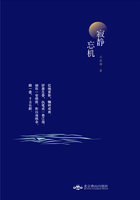In the preceding chapter we have seen that everything that presents itself as an object of the will prior to the moral law is by that law itself, which is the supreme condition of practical reason, excluded from the determining principles of the will which we have called the unconditionally good; and that the mere practical form which consists in the adaptation of the maxims to universal legislation first determines what is good in itself and absolutely, and is the basis of the maxims of a pure will, which alone is good in every respect.However, we find that our nature as sensible beings is such that the matter of desire (objects of inclination, whether of hope or fear) first presents itself to us; and our pathologically affected self, although it is in its maxims quite unfit for universal legislation; yet, just as if it constituted our entire self, strives to put its pretensions forward first, and to have them acknowledged as the first and original.This propensity to make ourselves in the subjective determining principles of our choice serve as the objective determining principle of the will generally may be called self-love; and if this pretends to be legislative as an unconditional practical principle it may be called self-conceit.Now the moral law, which alone is truly objective (namely, in every respect), entirely excludes the influence of self-love on the supreme practical principle, and indefinitely checks the self-conceit that prescribes the subjective conditions of the former as laws.Now whatever checks our self-conceit in our own judgement humiliates; therefore the moral law inevitably humbles every man when he compares with it the physical propensities of his nature.
That, the idea of which as a determining principle of our will humbles us in our self-consciousness, awakes respect for itself, so far as it is itself positive and a determining principle.Therefore the moral law is even subjectively a cause of respect.Now since everything that enters into self-love belongs to inclination, and all inclination rests on feelings, and consequently whatever checks all the feelings together in self-love has necessarily, by this very circumstance, an influence on feeling; hence we comprehend how it is possible to perceive a priori that the moral law can produce an effect on feeling, in that it excludes the inclinations and the propensity to make them the supreme practical condition, i.e., self-love, from all participation in the supreme legislation.This effect is on one side merely negative, but on the other side, relatively to the restricting principle of pure practical reason, it is positive.No special kind of feeling need be assumed for this under the name of a practical or moral feeling as antecedent to the moral law and serving as its foundation.
The negative effect on feeling (unpleasantness) is pathological, like every influence on feeling and like every feeling generally.
But as an effect of the consciousness of the moral law, and consequently in relation to a supersensible cause, namely, the subject of pure practical reason which is the supreme lawgiver, this feeling of a rational being affected by inclinations is called humiliation (intellectual self-depreciation); but with reference to the positive source of this humiliation, the law, it is respect for it.There is indeed no feeling for this law; but inasmuch as it removes the resistance out of the way, this removal of an obstacle is, in the judgement of reason, esteemed equivalent to a positive help to its causality.Therefore this feeling may also be called a feeling of respect for the moral law, and for both reasons together a moral feeling.
While the moral law, therefore, is a formal determining principle of action by practical pure reason, and is moreover a material though only objective determining principle of the objects of action as called good and evil, it is also a subjective determining principle, that is, a motive to this action, inasmuch as it has influence on the morality of the subject and produces a feeling conducive to the influence of the law on the will.There is here in the subject no antecedent feeling tending to morality.For this is impossible, since every feeling is sensible, and the motive of moral intention must be free from all sensible conditions.On the contrary, while the sensible feeling which is at the bottom of all our inclinations is the condition of that impression which we call respect, the cause that determines it lies in the pure practical reason; and this impression therefore, on account of its origin, must be called, not a pathological but a practical effect.For by the fact that the conception of the moral law deprives self-love of its influence, and self-conceit of its illusion, it lessens the obstacle to pure practical reason and produces the conception of the superiority of its objective law to the impulses of the sensibility; and thus, by removing the counterpoise, it gives relatively greater weight to the law in the judgement of reason (in the case of a will affected by the aforesaid impulses).Thus the respect for the law is not a motive to morality, but is morality itself subjectively considered as a motive, inasmuch as pure practical reason, by rejecting all the rival pretensions of selflove, gives authority to the law, which now alone has influence.Now it is to be observed that as respect is an effect on feeling, and therefore on the sensibility, of a rational being, it presupposes this sensibility, and therefore also the finiteness of such beings on whom the moral law imposes respect; and that respect for the law cannot be attributed to a supreme being, or to any being free from all sensibility, in whom, therefore, this sensibility cannot be an obstacle to practical reason.














